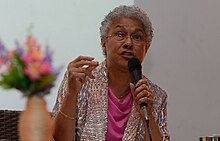Patricia Hill Collins
Appearance

Patricia Hill Collins (born May 1, 1948) is an American academic specialising in race, class and gender. She is a Distinguished University Professor of Sociology at the University of Maryland, College Park.
Quotes
[edit]- Oppressed groups are frequently placed in the situation of being listened to only if we frame our ideas in the language that is familiar to and comfortable for a dominant group. This requirement often changes the meaning of our ideas and works to elevate the ideas of dominant groups.
- Black Feminist Thought: Knowledge, Consciousness, and the Politics of Empowerment (2000) p. vii
- Social conditions that spur large numbers of people into action are ignored in favor of a Hollywood version of history focusing on one conquering hero. Since a movement for social change is embodied in its leader, death of the leader means death of the movement.
- "We don't need another Dr. King" in Civil Rights Since 1787: A Reader on the Black Struggle (2000), p. 908
- …In the United States, the dominant discourse is shaped by intersections of race, class, gender, sexuality, and nation as systems of power. In my work, I have investigated how racism, sexism, class exploitation, and heterosexism operate to shape the lived experiences of different social groups. Black women’s experiences were the point of entry into these larger questions of power and knowledge, but African-American women’s experiences are not the endpoint…
- On how she approaches any research regarding social inequality in “The Representation of African-American Women: An Interview with Patricia Hill Collins” in Global Dialogue
- …In the United States and similar multicultural societies, media representations of women differ depending on varying combinations of race, gender identity, ethnicity, class and citizenship status. The white middle-class heterosexual woman holding US citizenship is held up as an ideal type for women from other groups. This is an ideal, a representation, a social construction and not an actual category of people…
- On what is considered an ideal representation of U.S. femininity in “The Representation of African-American Women: An Interview with Patricia Hill Collins” in Global Dialogue
- …A quality public education also aims to cultivate a knowledgeable public that holds fast to broader ethical principles of equity and fairness. But an educated public requires not just information, but also skills of critical thinking that enable its members to make informed decisions. A good public education equips people with skills of critical analysis so that they can tell the difference between so-called fake news and reputable professional journalism…
- On how she defines “public education” in “Interview with Patricia Hill Collins on Critical Thinking, Intersectionality and Educational: key objectives for critical articulation on Inclusive Education” in Journal for Critical Education Policy Studies (2019)
- I think that feminism has the potential to be extremely radical, if it recognizes the power of women's work in sustaining families and communities. Feminism must do a better job of cultivating the radical potential of what women can and already do in their everyday lives as sisters, mothers, teachers, daughters and wives. Changes and public policies and workplace conditions in the public sphere to make them more amenable to women are extremely important. But radical change in two institutions that touch all women, the so-called private sphere institutions of families and communities, is equally if not more significant…
- On how she believes that feminism might evolve in “Interview with Patricia Hill Collins on Critical Thinking, Intersectionality and Educational: key objectives for critical articulation on Inclusive Education” in Journal for Critical Education Policy Studies (2019)
- Challenging power structures from the inside, working the cracks within the system, however, requires learning to speak multiple languages of power convincingly.
- Racism didn't magically go away just because we refuse to talk about it. Rather, overt racial language is replaced by covert racial euphemisms that reference the same phenomena-talk of "niggers" and "ghettos" becomes replaced by phrases such as "urban," "welfare mothers," and "street crime." Everyone knows what these terms mean, and if they don't, they quickly figure it out.
- On Intellectual Activism (2012)

